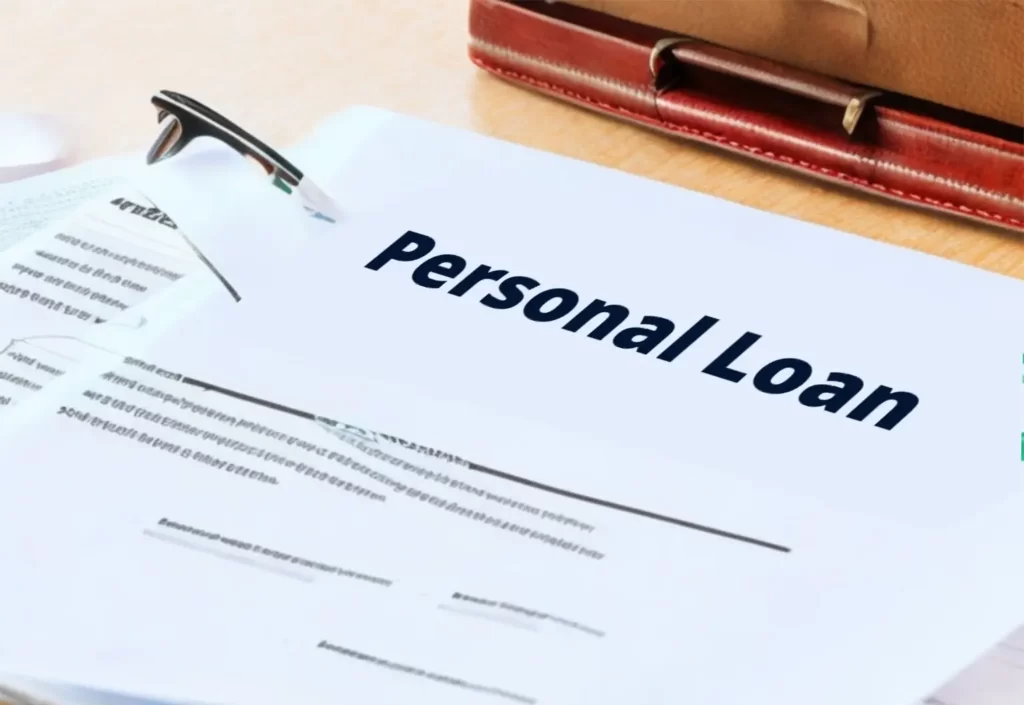Personal loans are versatile financial tools that offer individuals money for various requirements. What is a benefit of obtaining a personal loan? They provide you with the liberty to use the money any way you like and offer regular repayment terms and lower interest rates than credit cards. In-depth information about personal loans, the benefits of obtaining a personal loan, and the procedure for applying are covered in this comprehensive guide.
What is a Personal Loan?
A personal loan is a type of instalment loan that individuals can obtain from financial institutions such as banks, peer-to-peer lenders, or online lending platforms. Unlike credit cards or lines of credit, the benefits of getting a personal loan provide borrowers with a lump sum of money upfront, which can be used for various purposes. These loans come with fixed interest rates and are repaid over a specific term through monthly instalments.
How Personal Loans Work

Various financial institutions, including traditional banks, online lenders, and peer-to-peer lending platforms, issue personal loans. Here’s a breakdown of how personal loans typically work:
- Loan application: Start by researching different lenders and comparing their loan offers. Once you’ve selected a lender, please complete the loan application form, providing accurate information and necessary documents.
- Loan approval and terms: The lender evaluates your application, including credit history, income, and other factors. If approved, you’ll receive a loan offer outlining the loan amount, interest rate, repayment terms, and any applicable fees.
- Repayment: Personal loans typically have fixed monthly payments over a specific term. Please make regular payments according to the schedule that was agreed upon to repay the loan. Some lenders offer flexible repayment options, including automatic deductions from your bank account. Budgeting and managing your finances responsibly is vital to ensure timely repayments.
- Interest and fees: Personal loans come with interest charges determined by the interest rate specified in the loan agreement. The interest is calculated based on the outstanding loan balance. Additionally, origination fees or other charges may be associated with the loan. Be sure to consider these costs when assessing the loan’s affordability.
- Early repayment and prepayment: Some personal loans allow early repayment or prepayment without penalties. This means you can pay off the loan before the end of the loan term, potentially saving on interest charges. However, checking the loan terms and any associated fees for early repayment is essential.
- Credit impact: When you apply for a personal loan, the lender may conduct a credit inquiry, resulting in a hard inquiry on your credit report. This can temporarily impact your credit score. However, if you make timely payments and manage the loan responsibly, it can positively affect your credit score over time.
Who Can Apply for a Personal Loan
- Salaried individuals: Individuals who are employed and receive a regular salary from a private or government establishment are eligible for personal loans. Lenders typically require a minimum age of 21 and a maximum age of 58 for salaried applicants.
- Pensioners: Retired individuals who receive a pension from their previous employment can also apply for personal loans. Lenders may have specific age limits and requirements for pensioners.
- Self-employed professionals: Professionals such as doctors, engineers, architects, consultants, and others can qualify for personal loans. They need to provide proof of their business or professional income and meet the lender’s criteria, which may include a minimum business history of one to three years.
- Business owners: Personal loans can also be suitable for business owners looking to fund their business ventures or cover business-related expenses. When considering such applications, lenders assess the business’s financial health and the borrower’s ability to repay the loan.
Applying for a Personal Loan

1. Eligibility Criteria
- To apply for a personal loan, individuals must meet specific eligibility criteria.
- Salaried individuals or pensioners from private or government establishments and self-employed professionals like doctors, engineers, architects, consultants, etc., are generally eligible.
- Age requirements range from 21 to 58 years for salaried individuals and 25 to 65 years for self-employed individuals.
- Minimum annual income criteria typically range from INR 10,000 to INR 15,000 per month for salaried individuals and INR 3 lakh per annum for self-employed individuals.
- Additionally, lenders often require salaried individuals to have a minimum work experience of one to three years. Self-employed individuals should have a stable business history of one to three years.
2. Application Process
Step 1: Research and Compare
- Start by researching different lenders and their personal loan offerings.
- Compare interest rates, loan terms, repayment options, and any additional fees or charges.
- Look for reputable lenders with positive customer reviews and a track record of transparent lending practices.
Step 2: Gather Required Documents
- Prepare the necessary documents for the loan application process.
- These typically include proof of identity, address, income, employment details, bank statements, and any additional documents the lender specifies.
- Having these documents ready beforehand can speed up the application process.
Step 3: Online Application or Visit the Lender
- Most lenders offer online application options, which allow you to conveniently fill out the application form from the comfort of your home.
- Alternatively, you can visit a physical branch if you prefer. Provide accurate and complete information in the application form to avoid delays or rejection.
Step 4: Verification and Approval
- Once you submit your application, the lender will verify the provided information and documents.
- They may conduct a credit check to assess your creditworthiness.
- If approved, you will receive a loan offer detailing the loan amount, interest rate, repayment terms, and other relevant conditions.
Step 5: Acceptance and Disbursement
- Carefully review the loan offer, including all terms and conditions.
- If you agree with the terms, you can accept the offer electronically or by signing the agreement.
- Upon acceptance, the lender will disburse the loan amount to your designated bank account, typically within a few business days.
3. Loan Disbursement and Repayment
After the loan disbursement, you must manage your repayment effectively to maintain a good credit score and avoid financial difficulties. Follow these key steps:
- Set up automatic payments or reminders to ensure timely repayments.
- Make regular monthly payments by the agreed-upon repayment schedule.
- Avoid missing or delaying payments, which can negatively impact your credit score.
- Consider making additional payments or paying off the loan early to save on interest charges.
Benefits of Personal Loans

Wondering what is a benefit of obtaining a personal loan? Read below:
1. Flexible Use of Funds
Personal loans allow borrowers to use the funds for various purposes without restrictions. Whether you need to consolidate debts, finance home improvements, cover medical emergencies, or plan a dream vacation, a personal loan can provide the necessary financial support.
2. Lump-Sum Disbursement
One of the significant advantages of personal loans is receiving the loan amount as a lump sum upfront. This feature allows borrowers to address immediate financial needs, such as paying off high-interest credit cards, funding home repairs, or making significant purchases. With a lump sum, individuals can take control of their finances and manage expenses effectively.
3. Fast Funding
In urgent situations, personal loan providers can offer quick approval and funding. Some lenders transfer the loan funds to the borrower’s bank account on the same day of application, ensuring immediate access to the needed funds. However, it’s essential to research different lenders and their processing times to find the quickest option available.
4. Credit Score Building
Responsible use of personal loans can help borrowers improve credit scores. Making timely repayments and maintaining a low credit utilization ratio demonstrates financial responsibility and builds a positive credit history. A higher credit score can lead to better loan terms, lower interest rates, and increased borrowing capacity in the future.
5. Higher Borrowing Limit
Compared to credit cards, personal loans typically offer higher borrowing limits. Depending on the lender and the borrower’s financial profile, personal loans can range from $2,000 to $50,000 or even up to $100,000. This higher borrowing limit allows individuals to address significant financial needs that may not be feasible with credit cards or other financing options.
6. Lower Interest Rates
Interest rates on personal loans are generally lower than credit card rates, making them a cost-effective borrowing option. By choosing a personal loan over a credit card, borrowers can save a significant amount on interest charges, especially when dealing with large loan amounts or extended repayment terms.
7. Predictable Repayment Schedule
Personal loans offer a structured repayment schedule with fixed monthly payments and a defined loan term. Unlike revolving credit options such as credit cards, where borrowers can continuously borrow and repay, personal loans provide a clear repayment plan. This predictability helps individuals budget their finances more effectively and ensures they stay on track with repayment obligations.
Suitable Uses of Personal Loans
1. Medical emergencies
Personal loans can be a valuable resource when unexpected medical expenses arise. Whether for hospital bills, surgeries, or ongoing treatments, a personal loan can help cover these expenses quickly and provide financial relief during challenging times.
2. Vacation and travel
Whether it’s a well-deserved holiday or a memorable trip with loved ones, personal loans can be used to fund your travel plans. From airfare and accommodations to sightseeing and entertainment expenses, a personal loan can provide the necessary funds to create lasting memories.
3. Debt consolidation
Personal loans can be an intelligent solution for consolidating high-interest debts into a single, more manageable payment. By taking out a personal loan, you can pay off multiple credit card debts or other outstanding loans, simplifying your finances and potentially reducing your overall interest costs.
4. Home improvements and repairs
A personal loan can provide the funds you need if you want to renovate your home, make necessary repairs, or upgrade certain features. From remodelling your kitchen to fixing a leaky roof, a personal loan allows you to enhance the comfort and value of your property.
5. Wedding expenses
Weddings can be expensive, and many couples opt for personal loans to finance their dream celebrations. From booking venues and vendors to purchasing wedding attire and arranging transportation, a personal loan can help cover the costs associated with this special occasion.
6. Unexpected financial challenges
Life is unpredictable, and unforeseen expenses can arise at any time. Personal loans can help you navigate unexpected challenges such as car repairs, appliance replacements, or emergency home repairs. Having access to quick funds can alleviate financial stress and allow you to address these situations promptly.
Conclusion
The benefit of obtaining personal loans is that it offers individuals the flexibility and financial support they need for various purposes. Whether covering medical expenses, financing home improvements, or consolidating debts, personal loans provide a convenient way to access funds.
By understanding how personal loans work and considering their practical uses, eligible individuals can make informed decisions and choose the right loan option for their needs. Please remember to compare loan offers, review terms and conditions, and manage repayments to ensure a positive borrowing experience.
FAQ’s
Q1. How much can I borrow with a personal loan?
A. Loan amounts vary depending on creditworthiness, income, and lender policies.
Q2. What are the interest rates for personal loans?
A. Interest rates for personal loans depend on factors like credit score, loan amount, and repayment terms.
Q3. How long does it take to get approved for a personal loan?
A. Approval times can vary, with some lenders providing quick decisions within minutes or hours, while others may take a few business days.
Q4. Can I use a personal loan to pay off my credit card debt?
A. Personal loans can be used for debt consolidation, including paying off credit card debt.
Q5. How does a personal loan affect my credit score?
A. Personal loans can impact credit scores positively if payments are made on time and responsibly managed.

